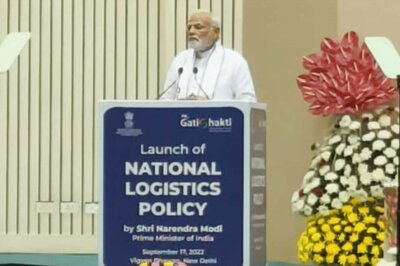
views
Karnataka Speaker KR Ramesh Kumar’s decision to disqualify 16 Congress and JD(S) MLAs and a BSP MLA “for the entire term” of the ongoing 15th Assembly is a stern and unprecedented decision.
Firstly, it sets a precedent and, if passed by a court of law, could decisively strengthen anti-defection laws. Secondly, in Karnataka’s present context, it only bolsters the BJP and ensures that the new BS Yediyurappa government will win the trust vote on Monday, and won’t have to worry about accommodating the rebel MLAs with ministerial berths or other positions.
The disqualification of 17 MLAs ensures a clear majority for Yediyurappa and the BJP in a House where the total number is reduced to 207 from 224. The BJP has the support of 107 MLAs, 105 on its own and 2 Independents, when it needs only 104 to have a majority in the effective House.
But the larger question that has been raised by the Speaker’s decision is on the effect of a disqualification order itself. The disqualification rules, under the Tenth Schedule of the Constitution, does not clearly state if such a decision by a Speaker prevents a member from contesting a by-election and re-enter the House after disqualification.
There have been several cases when disqualified MLAs have contested by-elections, as their seats go vacant, and re-enter the House. Recent example of the disqualification of AIADMK MLAs in Tamil Nadu, some of whom re-entered the ongoing Assembly in the state after by-elections, is seen as a precedent.
Some well-known constitutional experts, like BV Acharya, have argued that the Karnataka Speaker’s interpretation that the disqualification would mean MLAs cannot re-enter the present Assembly after by-elections is “erroneous”. But this is still a moot point and needs to be settled in a court of law.
In effect, it is a test balloon that could become a precedent. The Karnataka Speaker’s decision effectively strengthens the anti-defection law and makes the punishment for disqualification extremely severe.
It is a known fact that several defectors aim for positions and cabinet berths in a changed dispensation, and hence are lured to shift sides despite party whips. The fact that the anti-defection laws, under the Tenth Schedule, prescribed that disqualification was to prevent horse-trading of legislators.
However, when a disqualification simply means a by-election to a constituency where the disqualified MLA can contest and return to office, then it negates the spirit of the law. While a disqualified member may not immediately take oath as a minister till re-elected, the sheer fact that they can return to the House within a matter of months through a by-election negates the consequences of disqualification.
The matter becomes more complex in Karnataka’s present scenario where the JD(S)-Congress coalition MLAs resigned before a vote of confidence was brought in the House. But the Speaker had not accepted their resignations till the vote was carried out.
This could mean that in the absence of the Speaker accepting their resignations, the MLAs were still bound by the Congress and JD(S) whip and had to vote for the coalition. But the apex court, which was approached before the trust vote, did not rule that the MLAs had to follow the whip or could be forced to attend the session.
In effect, the court would have to decide on two issues. Firstly, is disqualification applicable to MLAs who submit resignations before the trust vote takes place? Secondly, if such a disqualification means the MLAs cannot contest a by-election to re-enter the House.
Both these issues are of extreme importance in determining the strength of anti- defection rules in the legislature and could pave the way for new interpretation and clarity.
It must be stated here that the BJP only benefits from the Speaker’s order to disqualify the rebel Congress and JD(S) legislators. Till the matter is settled in a court of law, the BJP need not worry about accommodating the rebels in Yediyurappa’s cabinet and that gives it ample time to settle down in the state administration.
The road ahead for the rebels is also blurred and they may not be in a position of power to negotiate with the BJP. This also gives a sense of stability to the BJP government. Irrespective of whether there is disqualification or resignation of MLAs, the outcome is a by-election to the 17 Assembly seats and the BJP would hope to muster its numbers and win enough to have a simple majority in a full House.
In the end, the rebels of Karnataka may well be the biggest losers as the Speaker’s decision goes through the legal corridors and may have a hazy road ahead as the BJP cements its position in the southern state.
(The author is a senior journalist)



















Comments
0 comment